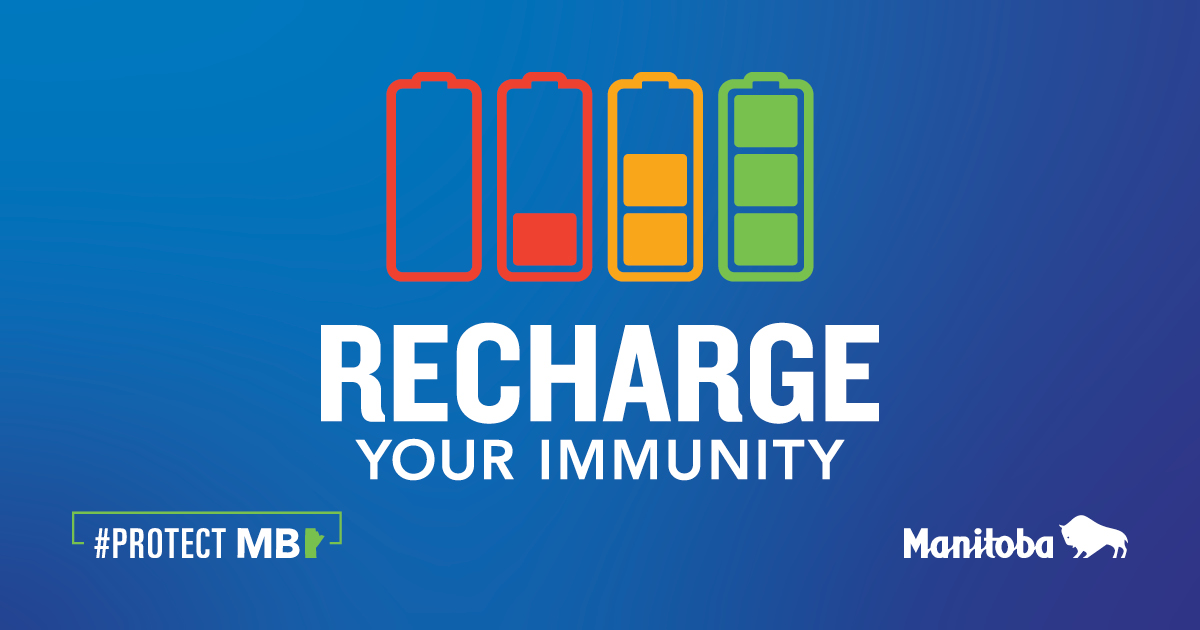| We are all seeing that Omicron is highly transmissible and with our kids returning to school for in person learning next week I’ve been getting a lot of questions.
Let’s first start with what we know about Omicron and vaccinations. Studies are showing that vaccination is not as effective in preventing transmission of the Omicron virus as we’d hoped, however the vaccines ARE showing good protection against severe outcomes like ended up in the hospital or the ICU.
In Manitoba we have seen that the unvaccinated are 20X more likely to end up in intensive care than those who are vaccinated. Studies also show that a 3rd dose of the mRNA vaccine provides significantly higher protection for Omicron, helping to reduce severe symptoms and hospitalization. The COVID-19 vaccines are effective, saving lives and reducing the need for further restrictions. Imagine what our hospitalization numbers might look like if we didn’t have such a high rate of vaccination uptake!
We talk a lot about who is at risk of ending up in the hospital. More of us than you would think have risk factors. Risks for being hospitalized include being older than 50 or having common health conditions like diabetes, COPD, heart disease etc. For those of us with these risk factors, it is especially important to recharge your immunity as soon as you’re eligible and book your 3rd dose appointment. |
|
Vaccines for Kids 5-11
Knowing how transmissible Omicron is, schools are doing their very best to create a safe environment for in-person learning. A critically important part of being ready to return to school is ensuring that children and youth are vaccinated. While the risk of severe disease and hospitalization is low for children aged 5 to 11, unfortunately some do become very ill. Even if they remain healthy, children can still easily spread the virus, infect someone who has less immunity, and cause more pressure on the health care system. There are many reasons to vaccinate your children.
Health Canada’s approval for children aged 5-11 was based on a clinical trial involving over 3,000 young children receiving the Pfizer vaccine. The study found that the vaccine protection level against symptomatic COVID-19 was 90.7%. The study also showed that if immunized children did get infected, they experienced milder illness. This is still the case, even with Omicron now representing most cases.
While some children in the study experienced mild vaccine reactions like a sore arm or fever, there were no safety issues found. As a parent you have 2 options in front of you. You can choose to give your child the vaccine or you can choose not to. Choosing not to vaccinate your child puts them at higher risk of infection, of long COVID, of ending up in the hospital and quite simply higher risk of experiencing a negative health outcome than if they had received the vaccine. If you are a parent, the decision to vaccinate your children is an important one and I encourage you to base your decision on the available evidence after weighing the benefits and risks.
Second Dose Eligibility for Kids
Many parents who have taken their kids for their first dose have questions about eligibility for their kids’ next dose wondering if the waiting period for a second dose should be shortened. In the context of the spread of Omicron, the National Advisory Committee on Immunization recently examined the interval between first and second doses for children aged 5 to 11, to determine if a shorter interval would provide more protection.
NACI determined that eight weeks was still the recommended interval. Manitoba’s provincial Pediatric Vaccine Advisory Committee re-affirmed theirrecommendation of an eight week interval between doses, even in the setting of Omicron. (Note that the First Nations Pandemic Response Coordination Team recommends a 3 week interval for children living in First Nations communities).
Additionally, they are not without protection. A recent vaccine dose, even if it’s your first one, will still trigger an immune response. Children had robust immune responses in the original trials and so we expect that even if the first dose does not provide the full benefit of two doses, it’s still very good. We expect that the first dose will prevent the vast majority of severe illnesses in children.
In some circumstances it may be possible to shorten the duration between first and second doses for this age group to a minimum of 21 days. Parents are encouraged to discuss their concerns with a health professional before arriving for their appointment. Clinic staff will discuss individual circumstances to determine next steps for those who request an early second dose.
Finally, we don’t know what might be coming next. We don’t know when, if and what kind of variant might circulate in our communities in the future. So while we want our children protected against Omicron, we also need to think about giving them the best possible protection in the months to come. If your child has a unique situation that might change the risk/benefit balance for them, please talk to your doctor.
Immunization for Those Under 5 Years
In recent months, I have heard from parents who are concerned that their young children are not yet eligible for vaccine protection from COVID-19. Unfortunately, we have received disappointing news on this front. Studies are showing that two doses did not bring about the same kind of robust immune response in 2 to 5 year olds as with adults. Pfizer has announced that it will be amending the clinical trial of its vaccine for children 6 months to 5 years old to add a third dose.
We will keep you updated as information becomes available. But for now I can say that it looks like we will still be waiting awhile for a vaccine for kids under 5.
Boosters for Youth Age 11-17
Youth ages 11 to 17 are eligible for their first and second doses of Pfizer, but we have not yet received guidance on third doses for youth in this age group. None of the Canadian provinces are currently providing booster doses for teens. But NACI is looking at this situation and we will update you as soon as we hear more from them.
Don’t Delay – Get Your Appointment Booked
In addition to the provincial vaccine clinics, you can get vaccines at your family’s medical clinic, your local pharmacy, a community or a pop-up clinic. As well, many schools in the province are hosting in-school and after school clinics for students. This may be a convenient way for you to get your child vaccinated. If you are unsure of the date of your own or your child’s vaccination please check your online immunization records. |
|
| The COVID-19 vaccine is extremely effective in helping to reduce your chance of catching COVID, but more importantly it helps to reduce the severity of symptoms, meaning you are much less likely to end up in hospital, in intensive care, or die from COVID.
Severe Outcomes by Vaccination Status in Manitoba
Age-standardized rates – Data is from Nov 22 2021-Jan 3 2022 |
|
| Omicron has spread rapidly through Manitoba and with many people contracting COVID, it is important to know how this impacts the scheduling of your booster dose.
If you have an appointment for your next dose and you are not feeling well and have COVID symptoms, you must follow public health orders and complete your period of self isolation prior to attending the appointment. Please reschedule your appointment for after you have finished your period of self isolation, and your symptoms have resolved. If you have COVID symptoms but you have not gone for testing, you should assume that you are infected with COVID and follow those same guidelines.
Anyone with an appointment they can no longer attend are asked to go online or call the vaccine call centre to rebook. This will help to free up your appointment time for another person.
Earlier in the pandemic, we asked those who had a recent COVID infection to wait for 3 months before they got their next dose. This was due to a limited supply of vaccines and wanting to ensure that those with no immunity were prioritized over people with some immunity from their infection. That is no longer the case.
The bottom line is: Don’t wait three months after your COVID infection, but do make sure you’ve recovered (symptom free and completed your period of isolation) before coming in for your booster dose. |
|
| The Moderna mRNA vaccine is available for those over 30 years of age. Our inventory of the Pfizer mRNA vaccine is low and we are prioritizing the remaining doses for those under the age of 30. If you are under 30 both options are safe but Pfizer is preferred. A small number of young men got vaccine related myocarditis which is a temporary, mild, treatable inflammation of heart tissue. Myocarditis was rare with Moderna, and even more rare with Pfizer. Therefore, when we have the option, Pfizer is preferred for the younger age group. Note that those over the age of 30 did not see the same increased risk of myocarditis regardless of which product they received.
While we have more studies showing effectiveness when all doses are the same, there is no clinical reason not to mix the doses.
Travel Plans
Some who are booking their booster doses have expressed concern about switching to Moderna as it relates to future travel plans. First, protecting yourself now is crucial. Please don’t make your vaccination decisions on the basis of possible future travel. Depending on where you plan to go, there will be different vaccination requirements. In some places, mixed COVID-19 vaccines aren’t accepted, and you will need to check on that. But in most places they are. In the USA for example, you are considered fully immunized if you received any mixture of the vaccines we offer in Canada. There is no scientific evidence to say that people who have a second or third dose, which is of a different vaccine, would have lesser immunity than the ones who have the same vaccine. So please get your second and third doses when they are recommended.
With cases of Omicron on the rise, it’s more important than ever to protect our loved ones, and prevent our healthcare system from being overwhelmed. Do you have questions about why a third dose is needed to protect you from Omicron? |
|
| A third dose of the COVID-19 vaccine is recommended for adults who are at increased risk of serious illness from COVID-19, their caregivers and close household contacts. Learn more about the full list of those eligible for a booster dose. Note that most people should wait 6 months after your second dose before receiving a third dose. And if you’re not sure when you had your second dose, you can check your record here. |
|
| New Booster Dose Finder Map – Book an appointment with your doctor, call your local pharmacy or use the vaccine finder on Booster page to find a location near you. |
|
| A pediatric Pfizer vaccine has been approved for children aged five to 11.
Parents and caregivers can begin making first-dose appointments for eligible children online or by calling 1-844-626-8222. Children must be five years old at the time the appointment is booked. Find more information on the vaccine for kids. |
|
| Talking with kids about vaccines and needles can be challenging, but we’ve got you covered! Dr Joss answers questions about vaccines in terms that young children can understand. Walk through this handout with your child, and invite them to ask you questions about the COVID-19 vaccine. |
|
| While it’s normal to be nervous about getting a needle–whether it’s a vaccine or another medicine administered with a needle–parents know all too well that sometimes we have to overcome our fears and do what’s good for us. We’ve created a tips sheet for parents with strategies and tips that help your kids be brave for their vaccination appointment.
Also, knowing that our kids have been affected by COVID-19 and many will remember the pandemic for years to come, consider how you might make their vaccine day special. A list of suggestions that might work for your family are included. |
|
| Find Your Flu Vaccine
The ProtectMB mapping tool allows you to locate not only your COVID-19 vaccination, but also your nearest flu vaccine clinic. Remember too that you can now get your flu and COVID vaccine at the same time. |
|
Until now, people living in Manitoba but without a Manitoba Health card could get vaccinated, but could not receive their immunization card. This has been addressed, as long as you:
- have received two doses of Pfizer, Moderna, AstraZeneca or a single dose of Johnson & Johnson vaccine, with the final dose more than 14 days ago; and
- have submitted proof of any COVID-19 vaccination(s) received outside of Manitoba to public health, and the data has been recorded in the system.
Then, call 1-844-MAN-VACC (1-844-626-8222) to speak with an agent, who will help you get the digital version of your card right away, and can also request a physical card on your behalf. If you received vaccines that are not approved by Health Canada – you can check our website to see how you also might be eligible for a vaccine card. |
|
| Using an app, you can now show your immunization card on your smartphone, even when not connected to wi-fi or cellular data.
Download the Manitoba Immunization Card app on your Apple or Android smartphone. Once downloaded and set-up is complete, the app will allow you to access your digital card at any time. |
|
| As with the physical card, the app will only show the person’s first and last names and a QR code. When scanned by the Manitoba Immunization Verifier app, the QR code will confirm that the person is fully vaccinated. To download the mobile app, visit the Apple iTunes store or the Google Play store. |
|
|
NOTE
When applying for your immunization card, to reduce the chances of a delay, please ensure that the spelling of your name matches your name as it appears on your Manitoba Health card. |
|
IMPORTANT
Manitobans are reminded that the new Pan Canadian PVC is ONLY available in digital format. When requesting your PVC at the website, do NOT request another physical Manitoba Immunization Card (unless you don’t yet have one). Your physical Manitoba Immunization Card will NOT have the new Pan Canadian PVC QR on it, only the Manitoba QR code. If you require a physical form of the Pan Canadian PVC you will have to print out a paper copy of the emailed PDF. |
|
Manitoba COVID-19 Vaccinations
Summary Statistics · January 12
|
|
| Total Doses Administered
2,601,144 |
|
|
| % of Eligible Manitobans with One Dose
84.7% |
|
| % of Eligible Manitobans with Two Doses
78.0% |
|
|
|





























